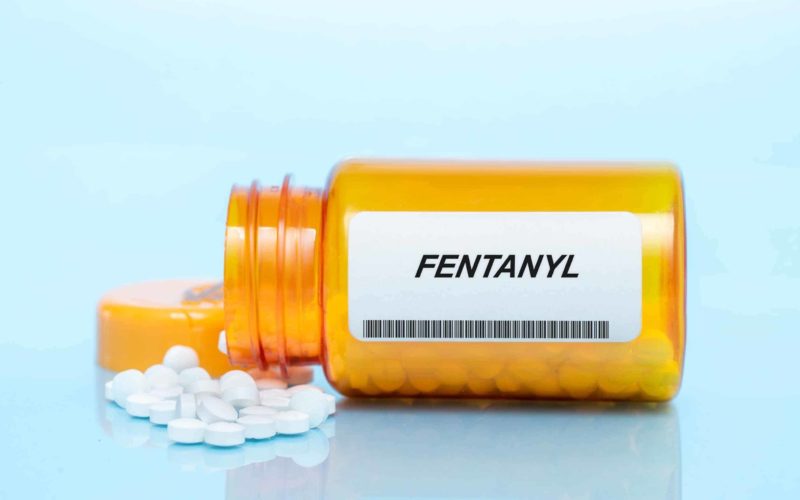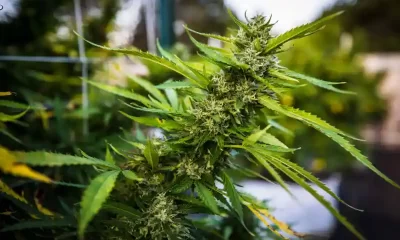News
DEA Scoops Up 36 Million Lethal Doses of Fentanyl Off the Streets

Enough fentanyl to kill 36 million people—nearly the size of the population of California—was taken off the streets in a recent federal drug sweep.
The U.S. Drug Enforcement Administration (DEA) announced the results of a widespread drug operation spanning May to September, resulting in over 10 million fentanyl pills and what they say is 36 million lethal doses of the drug. DEA agents blame the mass production of the majority of these pills on two particular cartels, the Sinaloa Cartel and Jalisco New Generation Cartel (CJNG).
While scooping up cartel-manufactured fentanyl off the streets sounds like reason to celebrate—keep in mind that this is only half the problem, and as many as 40% of opioid overdose deaths come straight from the doctor with a prescription, according to the U.S. Department of Health and Human Services. Fentanyl kills indiscriminately, no matter what the source. According to the National Safety Council, young Americans are more likely to die of an opioid overdose than a car crash.
However, it’s highly likely lives were saved in the process during this particular operation. The DEA released the statistics in a September 30 press release.
As part of the One Pill Can Kill initiative—a public Awareness Campaign to educate the public of the dangers of counterfeit pills such as fentanyl—the DEA and its law enforcement partners seized massive quantities of opioid drugs.
How extensive is the opioid epidemic? The DEA seized over 10.2 million fentanyl pills and about 980 pounds of fentanyl powder during the period of May 23 through September 8.
Often, fentanyl is pressed into blue, round pills that appear to be pharmaceutical in nature, so people think they’re safe. Often, they’re not. In addition, they’ve been showing up in different colors, dubbed “rainbow fentanyl” by the media and the DEA itself. Even people with a tolerance to oxycodone or hydrocodone might not stand a chance with fentanyl or its analogs like carfentanil.
According to the DEA’s math, the amount of fentanyl seized is equivalent to over 36 million lethal doses of the drug removed from the supply. DEA agents also seized 338 weapons including rifles, shotguns, pistols, and hand grenades.
“Fentanyl is responsible for killing thousands of people in the District of Columbia, Maryland, and Virginia (DMV). We are working diligently with our federal, state, and local partners to mitigate this public health crisis,” said Jarod Forget, DEA Washington Division’s Special Agent in Charge. “Our team is actively seizing significant amounts of deadly fentanyl and working hard on impactful operations and community events to halt the distribution of these deadly drugs into our communities. Mexican cartels are pushing deadly fake pills, often laced with fentanyl, into our neighborhoods to exploit the opioid crisis. We will relentlessly pursue criminals who are bringing such deadly drugs and continue to work to keep you and your families safe. Many people who die from fentanyl poisoning unknowingly consumed it mixed into fake pills or other drugs. Our message to the public is that you never can be certain what is in them and that just ‘One Pill Can Kill’.”
Nearly 400 cases were investigated, and 51 cases are linked to overdose poisonings. DEA agents linked 35 of the cases directly to one or both of the primary Mexican cartels responsible for the majority of fentanyl in the United States, which is the Sinaloa Cartel and CJNG.
Here’s how things have changed, however: According to the DEA, 129 investigations are linked to social media platforms like Snapchat, Facebook Messenger, Instagram, and TikTok. Anyone in the cannabis industry has seen plugs openly selling all sorts of drugs.
The last time statistics like this were provided was the One Pill Can Kill Phase II results, which were announced by DEA Administrator Anne Milgram last December.
The DEA says that fentanyl is the deadliest drug threat facing this nation. “In 2021, a record number of Americans—107,622—died from a drug poisoning or overdose,” the DEA release reads. “Sixty-six percent of those deaths can be attributed to synthetic opioids such as fentanyl.”
The fentanyl problem is highlighted by specific events, including a recent incident in suburban Los Angeles that involved pills laced with fentanyl that were disguised as something else. The Pasadena Police Department seized 328,000 fentanyl pills in a single operation on September 24, bringing their total seized to approximately 708,500 pills. Then just minutes away in Whittier, police seized eight pounds of pills laced with fentanyl.
Additional resources for parents and the community can be found on DEA’s Fentanyl Awareness page, and the DEA created a new resource, “What Every Parent and Caregiver Needs to Know About Fake Pills.”
Source: https://hightimes.com/news/dea-scoops-up-36-million-lethal-doses-of-fentanyl-off-the-streets/
Business
New Mexico cannabis operator fined, loses license for alleged BioTrack fraud

New Mexico regulators fined a cannabis operator nearly $300,000 and revoked its license after the company allegedly created fake reports in the state’s traceability software.
The New Mexico Cannabis Control Division (CCD) accused marijuana manufacturer and retailer Golden Roots of 11 violations, according to Albuquerque Business First.
Golden Roots operates the The Cannabis Revolution Dispensary.
The majority of the violations are related to the Albuquerque company’s improper use of BioTrack, which has been New Mexico’s track-and-trace vendor since 2015.
The CCD alleges Golden Roots reported marijuana production only two months after it had received its vertically integrated license, according to Albuquerque Business First.
Because cannabis takes longer than two months to be cultivated, the CCD was suspicious of the report.
After inspecting the company’s premises, the CCD alleged Golden Roots reported cultivation, transportation and sales in BioTrack but wasn’t able to provide officers who inspected the site evidence that the operator was cultivating cannabis.
In April, the CCD revoked Golden Roots’ license and issued a $10,000 fine, according to the news outlet.
The company requested a hearing, which the regulator scheduled for Sept. 1.
At the hearing, the CCD testified that the company’s dried-cannabis weights in BioTrack were suspicious because they didn’t seem to accurately reflect how much weight marijuana loses as it dries.
Company employees also poorly accounted for why they were making adjustments in the system of up to 24 pounds of cannabis, making comments such as “bad” or “mistake” in the software, Albuquerque Business First reported.
Golden Roots was fined $298,972.05 – the amount regulators allege the company made selling products that weren’t properly accounted for in BioTrack.
The CCD has been cracking down on cannabis operators accused of selling products procured from out-of-state or not grown legally:
- Regulators alleged in August that Albuquerque dispensary Sawmill Sweet Leaf sold out-of-state products and didn’t have a license for extraction.
- Paradise Exotics Distro lost its license in July after regulators alleged the company sold products made in California.
Golden Roots was the first alleged rulebreaker in New Mexico to be asked to pay a large fine.
Source: https://mjbizdaily.com/new-mexico-cannabis-operator-fined-loses-license-for-alleged-biotrack-fraud/
Business
Marijuana companies suing US attorney general in federal prohibition challenge

Four marijuana companies, including a multistate operator, have filed a lawsuit against U.S. Attorney General Merrick Garland in which they allege the federal MJ prohibition under the Controlled Substances Act is no longer constitutional.
According to the complaint, filed Thursday in U.S. District Court in Massachusetts, retailer Canna Provisions, Treevit delivery service CEO Gyasi Sellers, cultivator Wiseacre Farm and MSO Verano Holdings Corp. are all harmed by “the federal government’s unconstitutional ban on cultivating, manufacturing, distributing, or possessing intrastate marijuana.”
Verano is headquartered in Chicago but has operations in Massachusetts; the other three operators are based in Massachusetts.
The lawsuit seeks a ruling that the “Controlled Substances Act is unconstitutional as applied to the intrastate cultivation, manufacture, possession, and distribution of marijuana pursuant to state law.”
The companies want the case to go before the U.S. Supreme Court.
They hired prominent law firm Boies Schiller Flexner to represent them.
The New York-based firm’s principal is David Boies, whose former clients include Microsoft, former presidential candidate Al Gore and Elizabeth Holmes’ disgraced startup Theranos.
Similar challenges to the federal Controlled Substances Act (CSA) have failed.
One such challenge led to a landmark Supreme Court decision in 2005.
In Gonzalez vs. Raich, the highest court in the United States ruled in a 6-3 decision that the commerce clause of the U.S. Constitution gave Congress the power to outlaw marijuana federally, even though state laws allow the cultivation and sale of cannabis.
In the 18 years since that ruling, 23 states and the District of Columbia have legalized adult-use marijuana and the federal government has allowed a multibillion-dollar cannabis industry to thrive.
Since both Congress and the U.S. Department of Justice, currently headed by Garland, have declined to intervene in state-licensed marijuana markets, the key facts that led to the Supreme Court’s 2005 ruling “no longer apply,” Boies said in a statement Thursday.
“The Supreme Court has since made clear that the federal government lacks the authority to regulate purely intrastate commerce,” Boies said.
“Moreover, the facts on which those precedents are based are no longer true.”
Verano President Darren Weiss said in a statement the company is “prepared to bring this case all the way to the Supreme Court in order to align federal law with how Congress has acted for years.”
While the Biden administration’s push to reschedule marijuana would help solve marijuana operators’ federal tax woes, neither rescheduling nor modest Congressional reforms such as the SAFER Banking Act “solve the fundamental issue,” Weiss added.
“The application of the CSA to lawful state-run cannabis business is an unconstitutional overreach on state sovereignty that has led to decades of harm, failed businesses, lost jobs, and unsafe working conditions.”
Business
Alabama to make another attempt Dec. 1 to award medical cannabis licenses

Alabama regulators are targeting Dec. 1 to award the first batch of medical cannabis business licenses after the agency’s first two attempts were scrapped because of scoring errors and litigation.
The first licenses will be awarded to individual cultivators, delivery providers, processors, dispensaries and state testing labs, according to the Alabama Medical Cannabis Commission (AMCC).
Then, on Dec. 12, the AMCC will award licenses for vertically integrated operations, a designation set primarily for multistate operators.
Licenses are expected to be handed out 28 days after they have been awarded, so MMJ production could begin in early January, according to the Alabama Daily News.
That means MMJ products could be available for patients around early March, an AMCC spokesperson told the media outlet.
Regulators initially awarded 21 business licenses in June, only to void them after applicants alleged inconsistencies with how the applications were scored.
Then, in August, the state awarded 24 different licenses – 19 went to June recipients – only to reverse themselves again and scratch those licenses after spurned applicants filed lawsuits.
A state judge dismissed a lawsuit filed by Chicago-based MSO Verano Holdings Corp., but another lawsuit is pending.
Source: https://mjbizdaily.com/alabama-plans-to-award-medical-cannabis-licenses-dec-1/
-

 Business2 years ago
Business2 years agoPot Odor Does Not Justify Probable Cause for Vehicle Searches, Minnesota Court Affirms
-

 Business2 years ago
Business2 years agoNew Mexico cannabis operator fined, loses license for alleged BioTrack fraud
-

 Business2 years ago
Business2 years agoAlabama to make another attempt Dec. 1 to award medical cannabis licenses
-

 Business2 years ago
Business2 years agoWashington State Pays Out $9.4 Million in Refunds Relating to Drug Convictions
-

 Business2 years ago
Business2 years agoMarijuana companies suing US attorney general in federal prohibition challenge
-

 Business2 years ago
Business2 years agoLegal Marijuana Handed A Nothing Burger From NY State
-

 Business2 years ago
Business2 years agoCan Cannabis Help Seasonal Depression
-

 Blogs2 years ago
Blogs2 years agoCannabis Art Is Flourishing On Etsy













